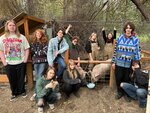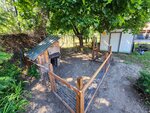


LEAVENWORTH - The Cascade Discovery Program recently opened its doors for the Cascade School Board to conduct their bi-monthly meeting and eat a very special dinner: honey ham raised by the students themselves. The savory aroma of freshly cooked ham wafted from the school’s open doors and into the warm spring air as board members enjoyed the juicy product of the combination of hands-on learning and sustainability practices.
“I [had] the opportunity to eat dinner at Discovery on May 13 and it was delicious! We also had lettuce from the greenhouse,” board member, Cyndi Garza, spoke about her experience at Discovery, “The students were knowledgeable and seemed excited to tell me about the pigs. It seems like a great program!”
The Discovery Program operates as an alternative to Cascade High School through a partnership with the U.S. Fish and Wildlife Service and Cascade School District. Located at the Leavenworth National Fish Hatchery, the program offers students a smaller classroom environment with added opportunities for hatchery mentorships and hands-on fish and wildlife experience.
In 2019, Discovery teacher Travis Blue worked alongside his students to install a pig enclosure and adopt two young pigs to raise as livestock. Overall, the project was a success, and the pigs were raised to maturity and used for food by the end of the school year. Wanting to improve upon the old enclosure and try their hand at raising livestock, the 2024 Discovery students adopted two more pigs, naming them Bucket and Princess Cauliflower.
“Our educational goals were multi-fold," Blue described the specific goals he had in mind for his current students as they cared for their pigs and raised them to be eaten. The two major learning outcomes that Blue focused on were awareness and sustainability.
“Most of us eat meat, and it's important to know where our food comes from—that it doesn’t just come from a package in the store; that it comes from a living being.” Building awareness of the process that an animal goes through to arrive ready-to-eat on our tables was a major goal for Blue when choosing to adopt the pigs. The idea was to make the students directly active within this complex process and thus more aware of what it takes to eat meat ethically; the 2024 Discovery class did not disappoint.
The new students felt unsatisfied with the size and quality of the original pig enclosure, so they designed a new one, using newer materials and a more secure design. The enclosure’s walls were expanded by 4 feet to give the pigs plenty of extra space using a simple, yet effective combination of wire fencing and wooden beams attached to buried cement supports.
“The first one we kind of scrapped together... but this new design the students went with was actually way easier to build, and it looks better,” Blue explained the major upgrades his students implemented to improve the pigs’ conditions.
To feed the pigs, students at Discovery utilized food waste from Cascade High School lunches, Discovery lunches, and carts of recently expired bread from Franz Bakery Outlet in Wenatchee. “This was all stuff that would have gone in a landfill... we were able to learn that it's actually pretty easy to reduce food waste,” Blue explained his second educational focus in caring for the pigs, sustainability. By using mostly food that would have otherwise gone to waste, the Discovery students were able to raise their pigs in a completely sustainable fashion. They also used the pigs to make extra fertilizer for their lawn by mixing dead leaves and other small plant waste into the enclosure to be mixed by the pigs.
This year, the pigs were ready to be harvested early, just in time for the school board’s annual spring visit to Discovery. After successfully serving up their first cut of ham to the school board, the students and staff at Discovery now plan on barbecuing a pig butt and serving pulled pork to celebrate the end of the school year. The students have also begun further improvements to the enclosure, ripping out old cement supports from the ground and pouring new ones as part of the overall expansion as well as designing a new house for the pigs to take shelter in.
Discovery student, Jack Kessler, reminisced lightheartedly on the process, “It was very interesting, and it was a new experience to raise an animal to be eaten... at one point I actually fell into the pig pen, it was like a marshland over there and [the pigs] pushed me into it.” When asked if he enjoyed the pork, Jack laughed, “Delicious. It was like revenge in every bite.”
The students at Discovery each played a part in caring for their pigs, spending time even outside of school to ensure their comfort and health. This rewarding process of raising livestock has left a lasting imprint on the program and its students as they plan to adopt more pigs and continue to educate themselves through hands-on practices in environmental science and sustainability.
Comments
No comments on this item Please log in to comment by clicking here